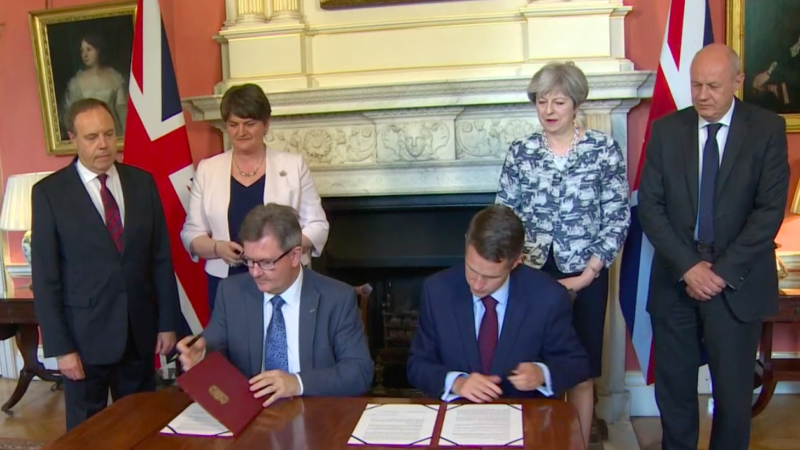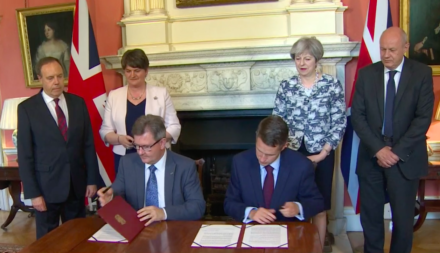

One billion pounds – or one hundred million for each DUP MP’s vote – is the amount that Theresa May’s government will have to cough up to keep the unionists from Northern Ireland voting for her policies, keeping her – and her government – afloat.
It’s a steep price, and one that has led to many jokes on Twitter that the PM has finally found the magic money tree, it was growing behind No10 after all. Aside from the grubbiness of the deal, and the potential risks that it poses to the peace process, it is also a win for Labour’s anti-austerity politics.
The DUP might represent a particularly nasty brand of socially conservative politics – but in fiscal terms, they are something altogether different to the conservatism we are used to in England, Wales and Scotland. They might be known for their prudence in comparison to Sinn Féin, but they are vehemently opposed to cuts to pensioner benefits, for instance.
Their opposition to these cuts means that a Labour manifesto pledge – to protect the pension triple-lock and the universality of winter fuel payments – will be enacted by the DUP-Tory hybrid government. The additional money, which by some analysis might be as much as the £2bn that the DUP were rumoured to be asking for, is going to be primarily spent on infrastructure projects.
The £1bn breaks down with an extra £400m for infrastructure over two years, £150m for broadband, £100m for health and education, £200m for health service transformation, £100m to tackle deprivation over five years and £50m for five years on mental health, according to The Guardian’s analysis.
These are precisely the sort of projects that Labour seeks to promote across the whole country – and if the money can be found for Northern Ireland, is entirely fair to ask that the rest of the country could get such funding boosts. But more than that – it shows the Tory argument that austerity, ‘living within our means’, or whatever you might want to call it – is nothing other than an ideological choice made when it was possible to make it. If now May’s team are able to choose something else, when it is politically opportune, it shows quite clearly that the regime of budget cuts seen from 2010 onwards were nothing other than opportunistic – quickly ditched for one nation as the need has arisen, to keep the Tories afloat.
Moreover, if giving this money to Northern Ireland, still one of the poorer parts of our nation, is shown to improve vital public services, it will prove that this can be done elsewhere in the country. Any argument that the politics of Labour, adequately funding the NHS or investing in infrastructure will only bankrupt us will be shown to be untrue.
The DUP – despite being ardent Brexiteers – do not want a return to a hard border with the Republic, nor do they want a special deal for Northern Ireland which to their mind could pave a path to unification of the island. They want a comprehensive deal on trade with the EU and to stay part of science and research programmes. So there is a clear sign that they could potentially soften Brexit, or at least make the most hard possible Brexit impossible. Whilst they may not be where many Remain-leaning Labour voters are, on these crucial points they are softer than May’s Tories.
We may not like the DUP – rightly – but their presence in government proves many of the Tories’ own arguments wrong, and could show how we are not only right to be anti-austerity, but that it is the only way for the nation to flourish.




More from LabourList
Antonia Romeo appointed to lead civil service as new Cabinet Secretary
‘If Labour is serious about upskilling Britain, it must mobilise local businesses’
Stella Tsantekidou column: ‘What are we to make of the Labour Together scandal?’